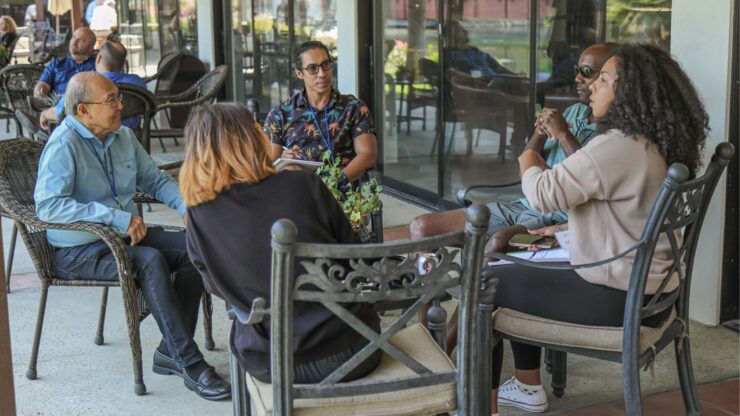Seven Reasons Why We Are Failing: Part 6

A Hidden Key for Creating a Disciple-Making Culture
Years ago, I heard Pastor Juan Carlos Ortiz tell this story. He was preparing to preach on Love. He had studied all week, examining various passages. He had looked at the words for love in Greek and Hebrew. He, of course, had taught on love many times before. He wanted this message to be impactful. What could he say this time about love that he hadn’t already said a thousand times before? In his study, he was convicted by the simple command, “Love one another.”
Pastor Juan Carlos Ortiz got up that Sunday morning and simply said this:
Brothers and sisters, the Bible says, “Love one another.”
With that, he closed his Bible, stepped off the stage, and sat down. Everyone waited for what was next. Nothing happened. Just awkward silence. After what seemed like an eternity, the pastor stood up and again stepped up to the pulpit.
Brothers and sisters, the Bible says, “Love one another.”
Again, he closed his Bible, stepped off the stage, and sat down. People were confused. This was unusual. Had someone missed their cue? Was someone else supposed to come up to the platform and do something? Sing a song, share a testimony, something? Nothing. Just awkward silence, again. One more time, Pastor Ortiz stood and stepped up to the pulpit.
Brothers and sisters, the Bible says, “Love one another.”
For the third time now, he closed his Bible, stepped off the stage, and sat down. This time though, something happened. A man sitting in the front row turned to the young man sitting next to him and said, “I guess the pastor wants us to love one another. Is there anything I can pray for you about?” The young man replied, “Well actually, yes. I need to travel back home today, but I don’t have the bus fare.” The older gentleman reached into his pocket, pulled out some money, and replied, “Well now, I don’t need to pray for you about bus fare. I can just give you that.” He placed the bills in the young man’s hand, they embraced, and continued to talk and learn more about one another and how they could pray for each other. Soon, across the room, person after person was turning to their neighbor, finding out their needs, and meeting them. The service never officially ended. People just kept caring for one another, some leaving together to go help with whatever the other needed.
This went on week after week. Juan Carlos Ortiz didn’t preach another message for a month. His people just kept gathering to care for one another, pray for one another, and meet one another’s needs. After a month, his elders approached him. “Pastor, your last message was so powerful. Look at what God has done in our church. We’re wondering though, what are you going to preach about next?”
That next Sunday, Pastor Juan Carlos Ortiz stepped up to the platform. He stood behind the pulpit once again. There was great anticipation. What word does the pastor have for us this time.
Brothers and sisters, the Bible says, “Love your neighbor as yourself.”
With that, he went on to explain that God had convicted him that to love your neighbor as yourself means to want the same thing for your neighbor that you want for yourself. His family had a housekeeper. They paid her well, and she was saving up to buy a house for herself and her small children. They were living in the slums of Argentina. So he and his wife decided they would do more than just pay her well. They would save up to help her buy her own house. They would skip going out to dinner, or to the movies, or other luxuries, and save that money up to help her get a home. And that’s exactly what they did!
Juan Carlos Ortiz led his church into a love revolution by simply inviting them, even expecting them, to do what Jesus had commanded. Love one another. Love your neighbor as yourself. No in-depth Bible study on love was needed. No parsing out the Greek and Hebrew was necessary. Just action. Just do it. Just love!
Could it be that we’re losing the next generation because they are tired of hearing about love your neighbor and not seeing love your neighbor? Have they given up on the all talk, no action inauthentic Christianity they see when they come to church?
7% of the next generation globally identify themselves as Christ-followers.
This Barna Group statistic was the focal point of a three day conversation in January among leaders gathered in Orlando from various youth ministry organizations. That statistic is alarming. It should cause us to ask, “Are we losing this generation?”
In this series, I’m unpacking SEVEN REASONS why I believe we’re failing as the church, and what we must do about it. If you missed the first five weeks of this blog series, you can find them here:
REASON ONE REASON TWO REASON THREE
REASON SIX
We don’t expect obedience.
What did Jesus say in the Great Commission?
“Therefore, go and make disciples of all nations, baptizing them in the name of the Father, and of the Son, and of the Holy Spirit; And teaching them everything I have taught you. And surely I will be with you, to the very end of the age.”
Is that what Jesus said? NO! He didn’t ask His disciples to teach everything He taught. This wasn’t about mastering content. This wasn’t about information transfer. This wasn’t about increasing knowledge. This wasn’t about getting a handle on theological concepts. It was something more.
“And teaching them to obey everything I have commanded you.”
Jesus had modeled His character and priorities. He had instructed His disciples in the way of the Kingdom. They had learned much, both through what they had seen and heard. And Jesus’ expectation with them was always obedience.
Think about our response when we see someone obey. Aren’t we often excited, as if obedience is some extraordinary thing? Why are we amazed when we see someone actually do what Jesus has commanded of them? Have we created a culture in our ministries where obedience is abnormal and exceptional?
There is a crisis of obedience in the church in North America.
Are we guilty of teaching as if Biblical commands are merely good principles to live by? Does our Biblical instruction inadvertently come across as a suggestion or a recommendation, but not a command to be obeyed? Have we created a culture where good Biblical teaching equates to “tell me something interesting I haven’t heard before?”
Another word for disciple is follower. We are called to be, and we are inviting others to be Christ-followers. Following implies doing. Following requires faith and obedience. To be a disciple means we’re more than a fan of Jesus. We’re a follower of His. We follow in His steps, modeling everything in our life after the character and priorities of Christ.
If we’re truly committed to making disciples, Christ-followers, we will have to teach differently. We will have to teach people to obey. I’m convinced teaching to obey requires simplicity, clarity and accountability.
Keep it simple.
A disciple needs to know what they need to do. Tell them.
Keep it clear.
A disciple needs to know how to do what they need to do. Show them.
Keep it honest.
A disciple needs to know that obedience is expected and you will hold them accountable to what Jesus is asking of them.
My dear friend Benjamin leads a vibrant missions organization in India. Over the past fifteen years, they’ve seen over 30,000 churches planted in India. From one small village to the next, and from one neighborhood to the next in large cities, disciples are being made and groups are being multiplied. Years ago, Benjamin shared their simple secret. They have created a culture of obedience in their groups. Every time they meet, they are asking and answering three simple questions with one another.
- What is the truth you must obey?
- Who will you pass this truth on to?
- Who will you tell about Jesus?
The first question involves obedience in their personal relationship with God. The second involves obedience in their encouraging and discipling of other believers. The third involves obedience in their testimony and witness with others who don’t know Christ. It’s not rocket science. It’s rather simple.
What are you going to do to follow Jesus this week?
These three simple questions are genius in that they hold believers accountable to Jesus’ two most basic commands: The Great Commandment and The Great Commission.
In The Great Commandment, Jesus combines Deuteronomy 6:5 and Leviticus 19:18 into His reply to the question, “What is the greatest commandment?”
“The most important one,” answered Jesus, “is this: ‘Hear, O Israel: The Lord our God, the Lord is one. Love the Lord your God with all your heart and with all your soul and with all your mind and with all your strength.’ The second is this: ‘Love your neighbor as yourself.’ There is no commandment greater than these.”Mark 12:29-31
In the Great Commission, Jesus summarizes His mission and His strategy for accomplishing it. The Mission… Make Disciples. The Strategy… Go. Baptize. Teach.
Then Jesus came to them and said, “All authority in heaven and on earth has been given to me. Therefore GO and MAKE DISCIPLES of all nations, BAPTIZING them in the name of the Father and of the Son and of the Holy Spirit, and TEACHING them to obey everything I have commanded you. And surely I am with you always, to the very end of the age.”Matthew 28:18-20
The three simple questions the believers in India ask and answer of one another each time they gather focus on the basic obedience Jesus desires of every disciple. It is summarized in six words.
LOVE GOD
LOVE PEOPLE
MAKE DISCIPLES
Depending on who you read, you’ll find anywhere from 49 to 120 to 300 commands of Jesus in the Gospels. Let’s not get hung up on the number though. All of the commands of Jesus are summed up in those six words. I would also argue that in Matthew 28, Jesus places a greater emphasis on teaching them to obey than He does on teaching them everything I have commanded you. The second deals with the head. It’s about knowledge. It’s about learning the commands of Jesus. And that’s important. But teaching them to obey deals with the heart. It’s about responding to Jesus in love and devotion. That’s even more important.
Have we been guilty of teaching them everything I have commanded you without teaching them to obey? If we have their heart, teaching them to obey, then our disciples will be ready to respond to everything Jesus has commanded of them.
Without obedience, there is no disciple-making. Without obedience, we’re only pretending to be disciples and make disciples. We don’t need to hear or preach another message on Love Your Neighbor. We need to see Love your neighbor. Obedience is a hidden key for creating a disciple-making culture in our ministries!
What next?
- First, look in the mirror. Are you modeling a life of obedience to Jesus’ most basic commands? How are you doing at Loving God, Loving People and Making Disciples? Who are you regularly meeting with and inviting to hold you accountable to following Jesus?
- Identify your Three. Jesus had Peter, James and John. Who will you spend extra time with? Who will you pour your life into? Who are you going to hold accountable to obey everything Jesus has commanded of them?
- Carefully evaluate your teaching. Do you place a greater emphasis on teaching them everything I have commanded you than you place on teaching them to obey? How can you intentionally shift your focus in your teaching to prioritize obedience?
- Carefully evaluate how your ministry is structured. Are relationships prioritized? Within your small groups, is there an expectation for obedience? What can you do to infuse accountability to the commands of Christ within your groups?
There’s a generation hungry to see and experience genuine Christ-following. Who will show them? Will we call out a life of obedience in them? We have a generation ready to rise to the challenge!
This post originally appeared at: A Hidden Key for Creating a Disciple-Making Culture – Sonlife
If you have enjoyed reading this, please consider joining our email list!











